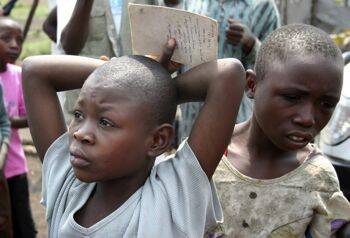A Congolese bishop has called on Catholics to struggle for reconciliation among families and tribes and to "denounce and fight" extortion and abuses by the Congolese police and military. Such practices are "one of the causes of the weariness and discouragement of our population," said an Easter pastoral letter by Bishop Philippe Nkiere Kena of Inongo. The bishop cited the contrast in the Mai Ndombe region between its abundant natural resources and the extreme poverty in which its population lives. The abundance of the region's natural resources brought the imposition of forced labor and cruel, savage and inhumane treatment by the colonial powers, he noted. This history engendered fear, suspicion of strangers, divisions and a sense of powerlessness that are still pervasive among the population. "We live today, without doubt, in a period of increased freedom, humanity and courage," Bishop Nkiere wrote. "But we must recognize that fear, divisions and a certain fatalism still hold us back from living truly and intensely, according to God's plan of love, manifest in Jesus." He said the commonplace practice of extortion and exactions by the Congolese military and police, whereby armed forces routinely extort small amounts of money from the civilian population at roadblocks, is partly responsible for keeping the Congolese population down. Such practices have been denounced by the U.N. peacekeeping mission and human rights organizations in recent reports. "We are called to struggle together against everything that degrades, humiliates or derides the human being in our weakest brothers and sisters," he said. "That is why any police extortion or exaction must be denounced and fought."








